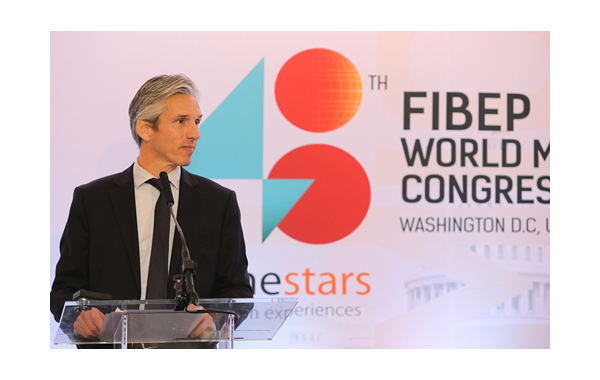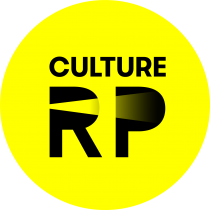From November 16-18th pressrelations attended the 48th FIBEP World Media Intelligence Congress in Washington, D.C. Every year delegates of media intelligence companies from different parts of the world come together at this congress to network, exchange best practices and dive into media and technology trends. This year’s congress went under the theme “From Media Intelligence to Business Intelligence”. Carolin Klinke, International Key Account Manager at pressrelations, talked to FIBEP President Alexis Donot* about the ongoing evolution of the media intelligence industry.

Last year’s FIBEP World Media Intelligence Congress was titled “From Media Monitoring to Media Intelligence”. This year’s congress has the theme “From Media Intelligence to Business Intelligence”. In the context of this evolution and change, how was the last year for you since you were elected president of the FIBEP ?
Alexis Donot : Well, regarding the business side of this, I think it is changing very fast and probably accelerating. In all the discussions that we have about media intelligence, we mainly talk about data now. In the past, we were more focused on the basics of media monitoring, and on measurement as well. But now we are talking about data, insights, and business. So the question is: What can we provide our customers to help them develop their business? We are now speaking about business intelligence, it’s a new trend involving some opportunities and some risks. I think the biggest risk for our media intelligence industry is that we could be uberized. In the past, communication agencies like Burson-Marsteller did not have the tools. Now they can buy them. Now it is quite easy to get the content, and to have partnerships with providers. This means the agencies have the data, the tools, the expertise, and the brand. They have the image and the power to offer clients a comprehensive range of services which integrates all the data collection and the processes etc. This could be a risk. When I see for example the positioning of Kantar – Kantar is a communication agency, as part of WPP maybe the biggest in the world – I think it is a concrete example of what is happening. Huge companies, more or less communication marketing companies with a lot of service departments providing different services for brands are becoming a one-stop-shop. There is a big trend, it is going fast, and probably there is a risk for our industry. After all it depends on where you are located. But more or less it goes the same way, and one day it will be the same everywhere. Business intelligence is probably the next market for us all. In my company, for example, we provide new services to different target groups. So we have to deal with new competitors as well. They are not in the media intelligence field but in the business intelligence field. We have new opportunities that we must seize.
How does this affect you as FIBEP President ?
I was of course proud to be elected President of the FIBEP. It’s a challenge because as president you are a volunteer, like the vice presidents as well, and we all know that what the members expect from the association is higher than it was in the past. Change is accelerating, so some of the members are a bit worried about the future. Probably they expect some help and answers from the association, so we must provide more. For this you need more resources, not only financial resources but also people. When you work with the FIBEP team, they are all in different areas of the world. When we meet, we organize conference calls, it is always difficult with the time differences. The topics we want to move forward with are not moving forward fast enough, that’s our difficulty. I emphasize that all members are more and more demanding, we must do something.
Based on what you said about how the industry is evolving and what challenges we are facing, what would be your most important tip for media monitoring companies for the coming year?
Alexis Donot : I think for media monitoring companies the challenge is to follow the customers’ requests and demands. It has been said today at the congress. They want a zero-error service, they want it 24 hours a day, 365 days a year. You must be available, you must provide everything instantly, and this is difficult. For the monitoring companies it is a challenge because once again, you need more resources, you need to invest. It is not only a question of people because you need the expertise and you must pay for it, of course. We are more and more in consultancy. It is not only about providing clips to the clients, I think soon customers will not request all those clips anymore. What they want is reports, charts, and all the things that help them make decisions. So monitoring providers must invest a lot in technologies or in partnerships. This requests money, people, and clients. The providers must make sure they don’t lose clients because the competition is very, very hard, and we see some new entrants. That is challenging for everyone.
How would you evaluate the role of partnerships for the companies ?
Alexis Donot : It is important. It is important because in the past what we used to do was to develop our own systems and technologies. We are still doing that to some extent but now we need to deal with partners to get the latest and best technologies, and to implement these to use them as soon as possible. Artificial Intelligence is a really good example. It’s developing very, very fast. At the beginning it was just a little trend but probably, in one or two years, it will be normal to use these kinds of systems. I was talking to Kasper Hülsen from Infomedia the other day. He told me that he is partnering with IBM Watson. Probably some of us are going to use Watson or similar systems. This is always a question of partnership, and you have to set up partnerships very fast because otherwise your competitor is going to do it before you, and you are going to lose clients. I want to stress that there are many, many changes for the industry. Not only for our industry. I’m quite sure that there are going to be a lot of consolidations in this business. A lot. I think in two years it is going to be completely different.
Would you say this is a good thing ?
Alexis Donot: Yes and no. Yes, because I think that is globalization. Our clients are concerned by that as well. We are dealing more and more with globalized clients, it is normal that they want a globalized service. A one-stop-shop with the content from all over the world, as soon as possible. It means they want it right now, and it must be available. Since all clients are more and more globalized, it is probably going to be the same with the providers in our industry, which is natural. It is a normal thing, and I would say it is a good thing because it is just an adaptation between demand and offer. But in the end, it could kill some innovation, some differences. When you have less companies, the offer becomes the same everywhere. It’s like when you travel, you go to the US or to Europe and wherever you go you are going to find the same shops. So if you want to buy something in the US to bring it back to Germany, you are not going to find something very special that you only find there. Everything is standardized, that is the effect of globalization we must deal with.
What could be the theme of next year’s congress ?
Alexis Donot: Hmm… business intelligence! laughs
From business intelligence to… ?
Alexis Donot: No, probably we’re going to stop here for a while because business intelligence is already what we all do. As long as you provide something to your client, you help him to develop his business. I think we are all in the business intelligence field, and probably it has been the case for a long time. But we didn’t know, in fact. Probably next year it is going to be something around business intelligence once again, but as a confirmation. This year it is more an open question: Are we legitimate? Do we provide business intelligence services? We can have these discussions, and we will find some people who agree and some who disagree and say: “No, I’m not in the BI business. I’m just providing some monitoring content, clips, and few measurement figures. And that’s it, that’s my business, we are not a BI company.” But you will find some companies like Kantar or iSentia, even Argus, who are already active in this field. And probably next year it will have changed a little bit. You will find more and more companies involved in the BI sphere. I think next year will be a confirmation. The theme could be “We are all business intelligence companies”. So now, we are legitimate, because yes, we collect the data, we analyze it, we do things with the data, we are in big data, we transform it into small data, we give sense and insights to the client, and now we also provide consultancy. We are not only talking to communications people but to marketing people, to strategy people, even to the board. Let’s bet that next year’s theme is going to be BI, “We are a BI industry”. It is a wide topic, of course, we are not covering all the BI field. That’s not the point. There are different industries that cover parts of the business intelligence topic. We cover a part of this, not the complete huge field of BI.
Thank you very much for your answers. pressrelations is looking forward to the next FIBEP World Media Intelligence Congress in Berlin.
*Alexis Donot graduated from ICD Business School and HEC Paris (MBA). He began his career in the communication and advertising sector before joining L’Argus de la Presse in 1995, a media intelligence family business founded in 1879 in Paris, France. Alexis represents the 4th generation at Argus and has taken the role of CEO in 2009. He has led the company to develop a new positioning and has been serving as FIBEP President since 2015.
Thanks to, Carolin Klinke, Key Account Manager International Connections bei pressrelations software business division “iCon” Carolin Klinke has been part of pressrelations since 2011. During her career she worked as part of the media intelligence team and led the press service division. Since 2014 Carolin has been part of the International Connections team and is responsible for the company’s software clients. She focuses on media intelligence technology, innovation and cooperation on an international level, provides software consultancy services, workshops and trainings, and works together with colleagues and customers to identify technological needs. Carolin holds a franco-german double master’s degree in media studies and is fluent in German, English and French.
Source :
http://www.pressrelations.de/blog/interview-with-fibep-president-alexis-donot/


